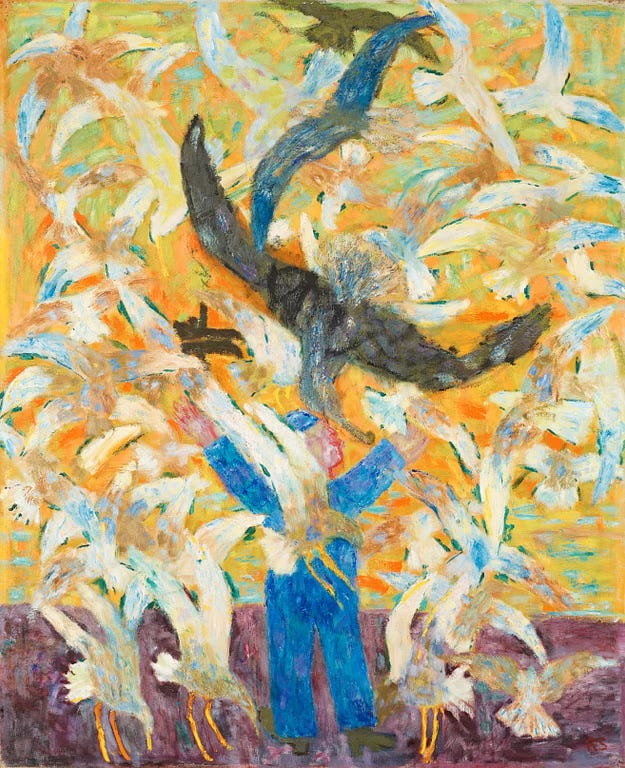Ragnar Sandberg, 1938-40
Lately I’ve had a hard time writing. Writing, at least in this format, means directing energy outwards, and all I want to do is burrow further inwards. I keep starting and erasing Substack posts and the tone of them changes depending on the day. I’m desperate to inhabit my most calm, centered and loving self. That’s not always possible.
In general, I’m happy with how I’ve acted. I can feel all the sensations in my body—I can notice my reaction to your anger, and control it—I can be supportive and accepting without forgetting how to be discerning. At 20, I couldn’t do any of those things. The skill I’ve been trying to develop for years is the ability to feel many competing emotions at once, hold them up to the light, and systemically work through them to reach a resolution. I’m not quite there yet, but I’m a lot closer.
It’s an important skill for anyone with strong emotions, in my opinion. It’s also specifically an important skill for women, who are more prone to being labelled hysterical or irrational. Naturally hot-headed, I’ve come to understand the ways my affect can be used against me. As a kid, I was brash, harsh, and erratic. These days, I aim for a sloshy warmth. Ideally, I’d like interacting with me to feel like sinking into the most comfortable couch in the world. Perfectly consistent, always receptive, totally present—right there, in your living room! Ideally, if I’m doing it right, no one would even consider the inner life of the couch, which is obviously so content just doing its couch things, probably writing a nice Substack post or rereading Pride and Prejudice.
The first reason I strive to be couchlike is consideration. I mean, it just obviously seems like the best way to be. The second reason is that in order to be able to examine things, you have to create space between you and your experience, to hold it at a remove. The last reason that I actually deeply want to be understood—in fact I want to be perfectly understood—and somehow my instinct is that the best way to do that is to present my personality like one of those AP Lit reading comprehension tests—what is the true meaning of this passage? Being oblique makes it so that when someone really does find me it feels so totally transcendent.
I understand that there’s something juvenile about all of this. A lot of what I’ve been working on the past few years is the ability to just say what I want directly, and trust that my needs will be gently received. It probably comes as no surprise that I’m also drawn to people who have a sort of oblique affect, where the layer that is surfaced is actually very far removed from the core self. And I think the question in those relationships is always—can we reveal our core selves to each other, and welcome them, and make it work?
I think at the heart of our relationship there was always a question of—what is at the bottom of it all? You always told me you didn’t know. For a long time, I was also content not knowing, or simply assuming. And then I started becoming a lot less oblique to myself. In some ways it’s an unsettling change, but in other ways it’s a welcome one.
The thing with coping mechanisms is that they work, but they’re inherently limiting. You can end up creating a structure for yourself that you disappear into like a hermit crab into a shell. Easy coexistence, nothing to justify or explain. You’re perfectly comfortable precisely because it doesn’t require you to grow or change. You remain in a stasis state forever, avoiding pain. But I’ve always been paranoid that by doing this I’m missing something important. Like: what if how I am is not the best way to be? What if my self-protection limits me from a certain kind of experience I might really like? I worry a lot about how things might be really bad on the other side, but I also wonder if they might be really good.
In the beginning, these transitions always feel farcical. Like—I’m so opaque, how could I possibly be transparent. I don’t know where to start, maybe it’s just not me. But then I know the only way to do it is work at it rigorously, one step at a time, like undoing a very complex knot. I find myself motivated by not what I might get or who I might be but by the possibility of a different kind of conscious experience.
Some recommendations
I read Anna’s favorite novel, Lucky Per, which is a fascinating Danish inverse bildungsroman published in 1898, and found this amazing James Wood essay on it:
Have I spoiled the plot by revealing the ending? The critic only gives away in silver what the great novel eventually releases as gold. Besides, it’s almost impossible to discuss “Lucky Per” without discussing the shape of its plot, because the radical oddity of the book is so bound up with the hero’s final renunciations.
Keep reading with a 7-day free trial
Subscribe to bookbear express to keep reading this post and get 7 days of free access to the full post archives.



